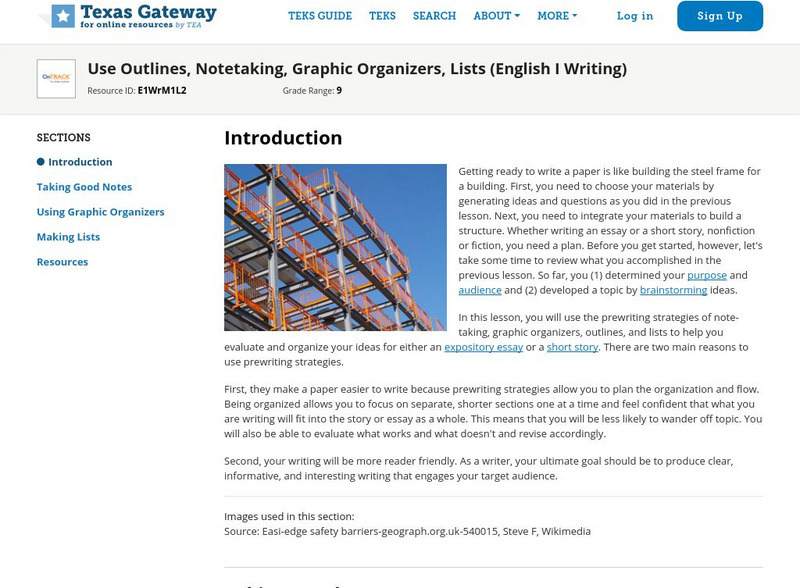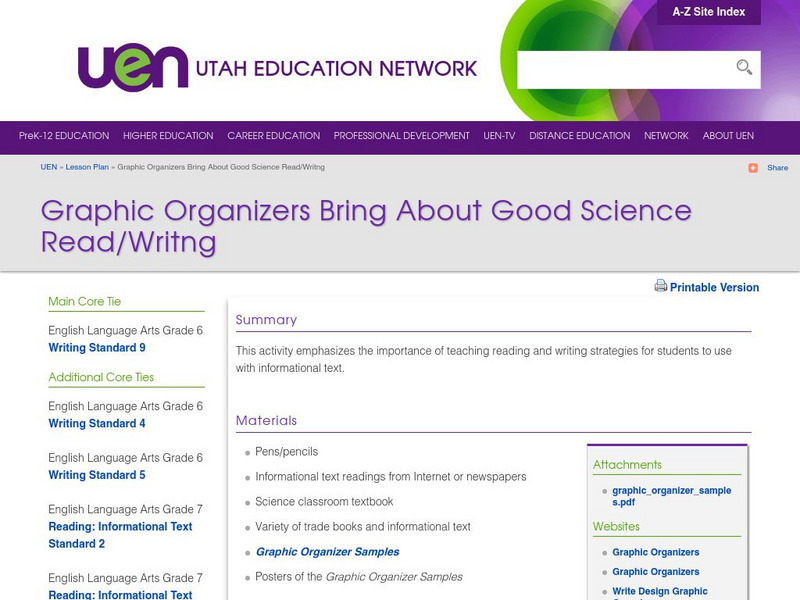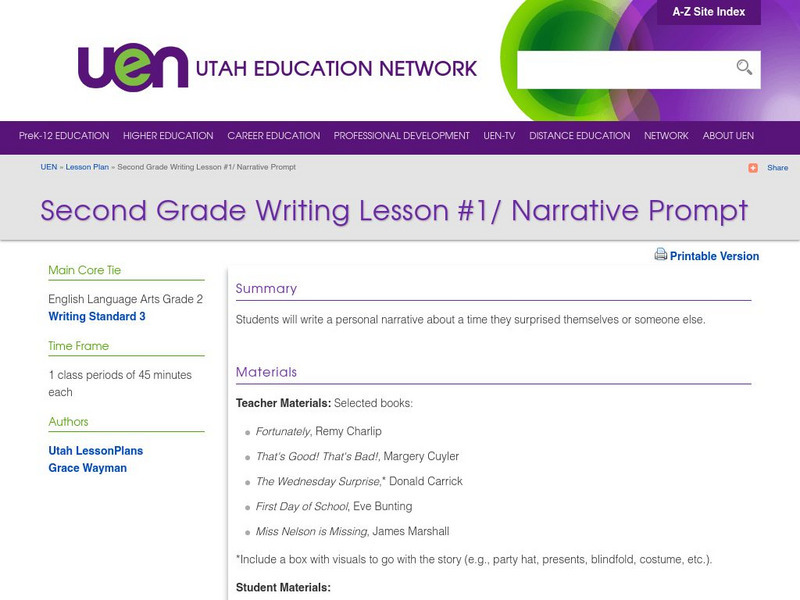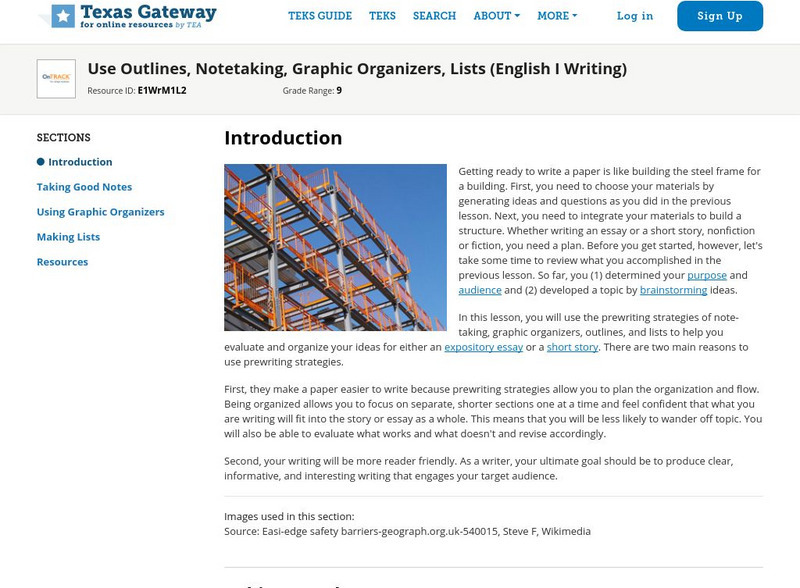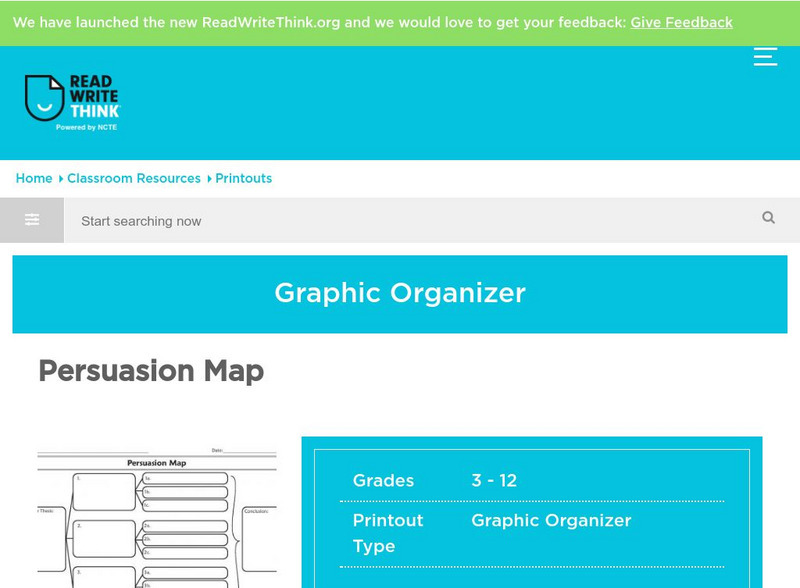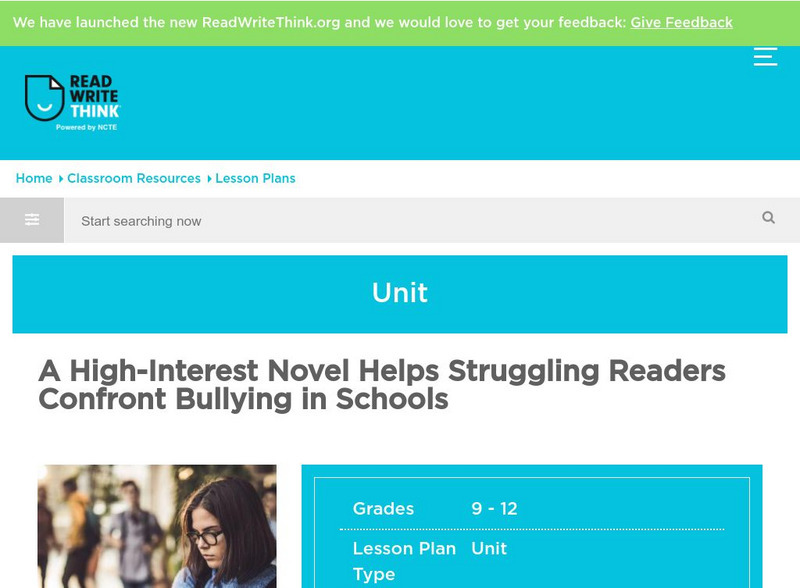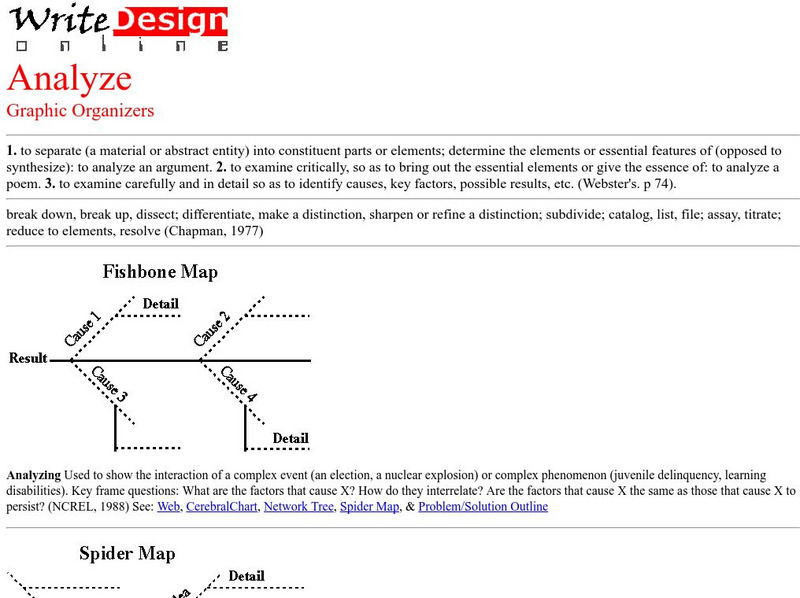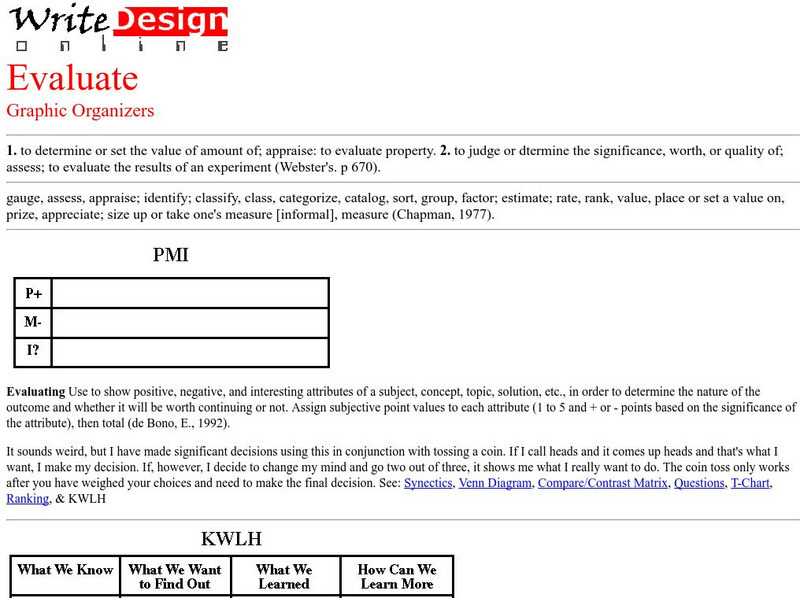EngageNY
TASC Transition Curriculum: Workshop 12
How can opinions slant facts? Workshop participants learn how to examine primary and secondary sources and identify the author's point of view. They also examine how visual art impacts the meaning and rhetoric of sources. Full of...
Daily Teaching Tools
Daily Teaching Tools: Free Graphic Organizers for Planning and Writing
This Daily Teaching Tools resource provides graphic organizers that students can use to plan their written pieces. Graphic organizers for all modes of writing are provided.
Other
Kim's Korner: Graphic Organizers for Writing and Reading
What are graphic organizers for reading and writing? Use this site to learn more about these learning tools.
Texas Education Agency
Texas Gateway: Use Outlines, Notetaking, Graphic Organizers, Lists
A learning module that teaches students about organizing information for an essay in four mini-lessons: Introduction, Taking Good Notes, Using Graphic Organizers, and Making Lists.
Daily Teaching Tools
Daily Teaching Tools: Free Graphic Organizers for Planning and Writing
This Daily Teaching Tools resource provides 30+ graphic organizers to aid in planning and writing. Students will be able to write informational pieces and literary responses.
Texas Education Agency
Texas Gateway: Using Graphic Organizers (English Iii Writing)
[Accessible by TX Educators. Free Registration/Login Required] You will learn how to use graphic organizers to help you evaluate and organize your ideas.
Texas Education Agency
Texas Gateway: The Writing Process: Outlines, Notes, Graphic Organizers, Lists
[Accessible by TX Educators. Free Registration/Login Required] You will learn how to use outlines, notes, graphic organizers, and lists to help you evaluate and organize your ideas.
Texas Education Agency
Texas Gateway: Use Outlines, Notetaking, Graphic Organizers, Lists
You will learn how to use outlines, notes, graphic organizers, and lists to help you evaluate and organize your ideas.
Reading Rockets
Reading Rockets: Descriptive Writing
This is a comprehensive article about what descriptive writing including what it is, why to teach it and strategies to teach it. It also features two videos Five Senses Graphic Organizer and Writing Poems as well as an annotated list of...
Daily Teaching Tools
Daily Teaching Tools: Graphic Organizers for Teaching Writing
This Daily Teaching Tools collection provides graphic organizers for writing. Elaborate graphic organizers for the following areas are provided: persuasive essays, expository essays, paragraph writing, fiction pieces, narrative writing,...
Utah Education Network
Uen: Graphic Organizers Bring About Good Science Read/writing
This lesson uses graphic organizers to engage middle schoolers in reading comprehension strategies for informational text in science. Venn Diagram, Hierarchy, Time Line, Cluster Diagram, and Flow Chart reproducible pages are included...
Utah Education Network
Uen: Second Grade Writing Lesson #1/ Narrative Prompt
This instructional activity engages students in working with narrative reading and writing. Students will listen to different stories and fill out story maps for them. Then students will plan a personal narrative about a "surprise" on a...
Daily Teaching Tools
Daily Teaching Tools: Customizable Graphic Organizers
This Daily Teaching Tools resource provides a series of customizable graphic organizers. Students will be able to engage in "during reading" strategies and writing process graphic organizers.
Sophia Learning
Sophia: Easy to Create Graphic Organizers
Two PDF's that can be viewed online or downloaded and printed. The first is one page showing students several examples of abbreviations that can be used when taking notes. The second is a four pages and shows how different types of...
Texas Education Agency
Texas Gateway: Use Outlines, Notetaking, Graphic Organizers, Lists
Learn how to use outlines, notes, graphic organizers, and lists to help you evaluate and organize your ideas.
Texas Education Agency
Texas Gateway: Writing Process: Use Outlines, Notes, Graphic Organizers, Lists
[Accessible by TX Educators. Free Registration/Login Required] Use outlines, notes, graphic organizers, and lists to help you evaluate and organize your ideas.
ReadWriteThink
Read Write Think: Persuasion Map
A printable graphic organizer for students to use when writing on opinion or persuasive essay. Directions on how to use this type of graphic organizer as well as lists of teaching ideas, lesson plans, and other resources are also...
ReadWriteThink
Read Write Think: A Novel That Confronts Bullying in Schools
In a multisession lesson, students read The Bully in stages, discuss the story events and issues related to bullying, and complete graphic organizers to help them organize story information. As students read, they write reflective...
Education.com
Education.com: 1st Grade Opinion Writing Practice
[Free Registration/Login Required] This collection of worksheets will engage kids in writing their own opinions and identifying their reasons for these opinions. Graphic organizers for opinion writing and prompts with "I would rather"...
Other
Write Design: Graphic Organizers: Analyze
Lists and describes several types of graphic organizers which fall under the "analysis" mold, including fishbone, spider maps, Venn Diagrams, and more.
Other
Write Design: Graphic Organizers: Brainstorm
Lists and describes several types of graphic organizers which fall under the "brainstorming" mold, including synectics, webs, cerebral charts, and network trees.
Other
Write Design: Graphic Organizers: Compare and Contrast
Lists and describes several types of graphic organizers which fall under the "compare and contrast" mold, including the Venn diagram, T-chart, and the compare/contrast matrix.
Other
Write Design: Graphic Organizers: Evaluate
Lists and describes several types of graphic organizers which fall under the "evaluate" mold, including PMI and KWLH charts (consult the site for what these terms mean).
Other
Write Design: Graphic Organizers: Hypothesize
Lists and describes several types of graphic organizers which fall under the "hypothesis" mold, including a hypothesis matrix and a questions chart.







